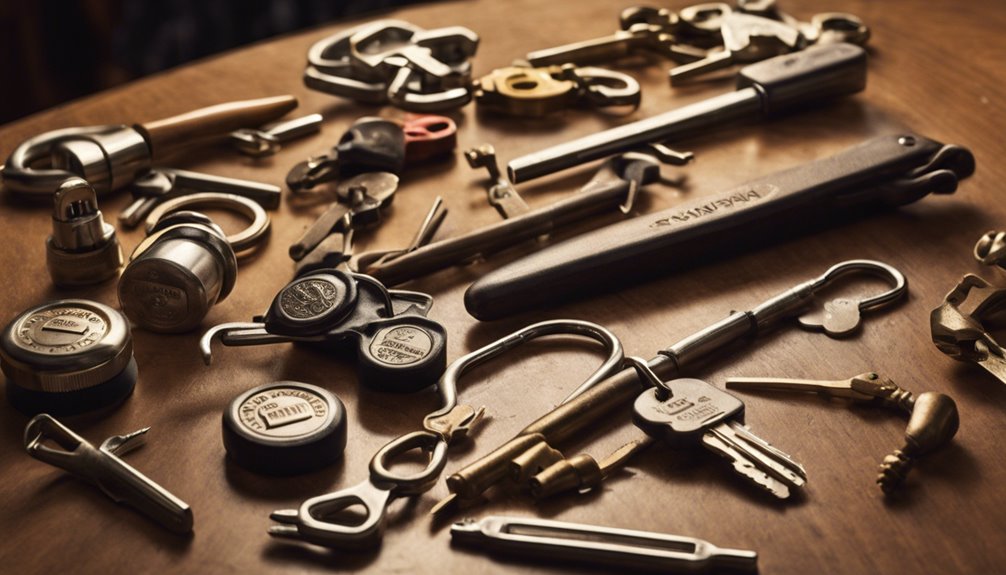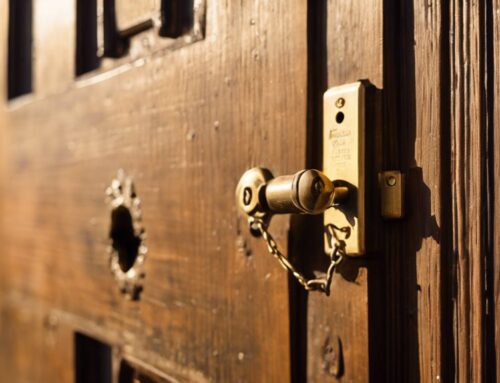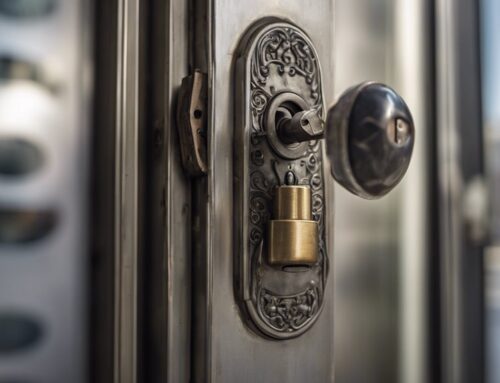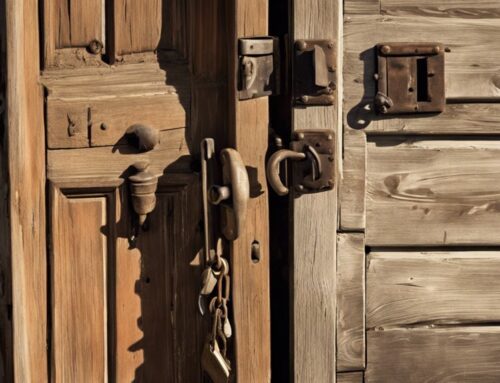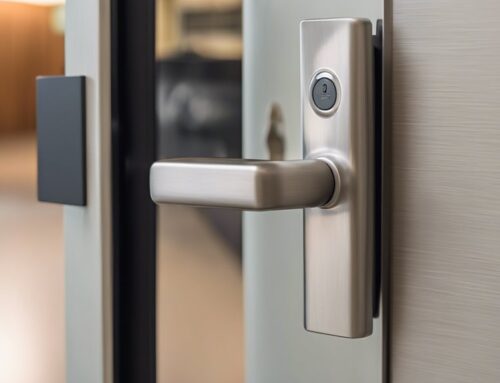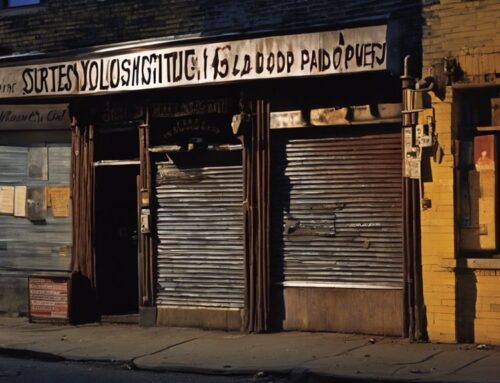It's funny—you might bump into a locksmith just as you lock yourself out of your car, but the reality of locksmithing in Pennsylvania is much more complex than that. While Pennsylvania doesn't require a specific state license for locksmiths, you'll find local regulations can be intricate. You need a Home Improvement Contractors license for larger jobs, and that's just the tip of the iceberg. Curious about what else you'd need to navigate this profession successfully? Let's unpack the essentials together.
Key Takeaways
- Pennsylvania does not require a state locksmith license, but a Home Improvement Contractors license is necessary for work exceeding $5,000 annually.
- Local municipalities may have additional licensing requirements, including business tax receipts and sales tax certificates.
- Proof of insurance is essential to operate legally as a locksmith in Pennsylvania.
- A $75 fee covers Locksmith Company registration, while a $20 fee applies for Locksmith Employee registration; DOJ fingerprint processing costs $32.
- Knowledge of eviction laws and foreclosure processes is vital for locksmiths to ensure compliance during legal operations.
Overview of Licensing Requirements

In Pennsylvania, understanding the licensing requirements for locksmiths is crucial, as there isn't a specific state license designated for locksmiths. Operating without a proper license can result in legal penalties, including fines and potential criminal charges.
While a state-level locksmith license doesn't exist, if your work exceeds $5,000 annually, you'll need a Home Improvement Contractors license. This license is managed by the state's Attorney General, and you'll have to provide a physical mailing address and proof of adequate insurance to qualify.
Local laws play a significant role, too, since requirements vary across municipalities. Some cities or counties may impose additional regulations, which could involve extra expenses and filing fees. It's also important to know that operating in multiple states may require separate licenses if you're planning to expand your services. Ongoing fees for business registration and certifications, including license renewal fees and certification updates, must be budgeted to maintain credentials.
You must comply with all local business regulations to operate legally, given there's no unified licensing system in Pennsylvania.
When it comes to employee licensing, if you run a locksmith business, you need to issue photo identification cards to your employees. Each ID must display essential information, including the employee's name, photo, business name, and license number, which employees must present while working.
Lastly, don't overlook insurance and financial obligations. Proof of proper insurance is necessary for the Home Improvement Contractors license, and various types of locksmith work may require general liability coverage.
Be aware that these costs can fluctuate, and additional expenses for bonding and other necessary requirements could arise. Staying informed about licensing requirements guarantees you navigate the complexities of operating as a locksmith in Pennsylvania effectively.
Application Process for Locksmiths

To successfully navigate the application process for locksmiths in Pennsylvania, it's essential to understand the specific steps involved.
Start by submitting your application for licensure along with the necessary application and license fee through the BreEZe system or by mail. If you're applying for a Locksmith Company (LCO) license, be sure to include details about the individual who'll manage the business daily.
Don't forget to attach two current passport-quality pictures and, if you're using a fictitious business name, include a certified copy of the declaration filed with the County Clerk. In Pennsylvania, it is important to be aware of the legal aspects of key duplication, ensuring that you comply with any permissions and restrictions related to this service.
Next, you'll need to undergo a criminal history background check through the Pennsylvania Department of Justice and the FBI. This step includes completing the Live Scan process and submitting your fingerprints to both state and federal databases. Locksmiths in Pennsylvania should also be aware of employment laws that protect their rights and ensure fair workplace practices.
If you're keen to start working, you can apply for a temporary registration, which is valid for 120 days, provided you have no felony convictions and answer all application questions "No." This allows you to begin operating while awaiting full licensure.
Additionally, be prepared to provide personal information, like your name, date of birth, and Social Security number. Lastly, ensure you stay informed about the licensing requirements in Pennsylvania to avoid any compliance issues during your application process.
Fees and Associated Costs

Fees associated with locksmith licensing in Pennsylvania can quickly add up, so understanding the costs involved is essential for anyone entering the industry. If you aim to operate as a locksmith company (LCO), you'll face a total of $75 encompassing a $30 application fee and a $45 license charge. On the other hand, if you're registering as a locksmith employee (LOC), you'll only need to pay a $20 registration cost. Both types require a $32 DOJ fingerprint processing fee, which is consistent regardless of your licensing path. Additionally, having completed a formal training program can greatly enhance your skills and job prospects. Pennsylvania's locksmith apprenticeships offer structured training and a pathway to certification, bolstering your industry credentials. If you're planning to perform over $5,000 worth of locksmithing work annually, you'll also need a Home Improvement Contractors license, which costs $52 for two years. To secure this license, you must provide proof of insurance and have a physical mailing address. Keep in mind additional costs may arise from local authorization requirements, which can vary by city. While your locksmith license remains valid for two years, note that there's no specific renewal fee from the state. However, keep in mind that city or local renewal fees may apply, and these can differ greatly. Pennsylvania law also addresses locksmith liability in cases of break-ins, which is an important consideration for minimizing risks as a locksmith. As you're budgeting for your locksmith business, don't forget about operational expenses like materials, insurance, and bonding. You may also need to take into account registering a fictitious business name or complying with specific local laws. Staying informed helps you maintain your freedom to operate without unexpected financial hurdles.
Background Checks and Qualifications

While Pennsylvania doesn't mandate background checks for locksmiths, understanding the qualifications can still greatly influence your success in the field. Although you won't face state-mandated checks or fingerprinting, many employers may still require you to undergo a background check during their hiring processes. Given that good moral and ethical standards are typically recommended, focusing on your character can enhance your prospects.
To become a locksmith in Pennsylvania, you don't need a formal education or specific certifications. However, completing a locksmith training program is highly advisable. You can find courses through local locksmith schools, online resources, or locksmith trade associations. These programs will equip you with essential knowledge about lock components, key making, and security systems, ensuring you're well-prepared for the job.
Gaining hands-on experience through apprenticeships can also be invaluable. Working with emergency roadside assistance providers or established locksmith businesses allows you to earn skills that parallel formal training. The state values experience: three years in lock installation, repair, and maintenance may even replace formal training in some contexts. In foreclosure processes, locksmiths play an essential role, ensuring compliance with legal responsibilities and operational practices.
While professional certifications like Certified Registered Locksmith (CRL) or Certified Master Locksmith (CML) aren't required, obtaining them can considerably boost your credibility and client trust. These credentials, though obtained through tests, demonstrate your advanced skills, setting you apart in the competitive locksmith industry.
In the context of evictions, locksmiths must be aware of their responsibilities and legal considerations to ensure compliance with Pennsylvania's eviction procedures, emphasizing the importance of professionalism during these situations.
Local Regulations and Compliance

Understanding local regulations and compliance is vital for locksmiths operating in Pennsylvania, as these rules guarantee adherence to both state and local requirements. While Pennsylvania doesn't mandate a specific locksmith license, if you're performing over $5,000 in residential or commercial work, you'll need to obtain a Home Improvement Contractors license. This license is processed by the state's Attorney General, and the fee is only $50 for a two-year term. In terms of business licensing, your commercial locksmith business must meet standard business licensing regulations. You need a physical mailing address and proof of insurance.
Although there's no state license specifically for locksmiths, local regulations might apply depending on your city or county. You may also need to acquire a local business tax receipt, and if applicable, a sales tax certificate. At the county level, there are no specific licensing requirements for locksmiths in Pennsylvania. You won't have to pay additional fees or obtain specific permits just for locksmith services.
However, it's important to remain compliant with general local business regulations. This includes maintaining valid business tax receipts and adhering to state and local tax laws. Ensuring that ADA compliance is met for locks and security systems is also crucial for businesses to operate legally within Pennsylvania.
Finally, while there are no specific renewal requirements for locksmith services, make sure that your business licenses and any applicable insurance documents are up-to-date. Staying informed about compliance requirements can help you operate freely and successfully within Pennsylvania's regulatory framework. Additionally, understanding Essential Lock Safety Standards in Pennsylvania can further ensure that property owners and locksmiths are following safety and legal compliance guidelines.
Frequently Asked Questions
Can I Operate as a Locksmith Without Any Formal Training?
Yes, you can operate as a locksmith without any formal training. Pennsylvania doesn't require formal education or licensing, allowing you the freedom to jump right in.
However, it's wise to contemplate taking specialty courses or apprenticeships, as they enhance your skills and credibility.
Though you're not legally obligated, gaining knowledge in key making and electronic security can set you apart and prepare you for running a successful locksmith business.
Are There Apprenticeship Opportunities Available in Pennsylvania Locksmithing?
Absolutely, you're stepping into a domain of opportunity!
In Pennsylvania, several local locksmith businesses offer apprenticeship positions that provide invaluable hands-on experience. While some may be unpaid, these apprenticeships immerse you in the technical, legal, and business aspects of locksmithing.
You'll learn from seasoned professionals, which could pave the way for future employment or even starting your own locksmith venture.
Keep an eye on local job postings and trade associations to find suitable opportunities!
How Long Does the Licensing Process Typically Take?
The licensing process for locksmiths typically takes a few weeks, though specific times may vary.
You'll submit your application online, which includes proof of insurance and necessary documentation.
After payment of the $52 fee, the Attorney General's office reviews your application.
While there's no set timeline, general practice suggests that most applicants receive approval within a month.
Ensuring all your materials are complete can help speed things up for you.
What Insurance Coverage Is Necessary for Locksmiths?
Imagine your business as a fortress; without solid insurance, vulnerabilities abound.
As a locksmith, you'll need general liability insurance to cover third-party damages and injuries.
Professional liability insurance is essential too, protecting you against potential mistakes or oversights.
If you've employees, workers compensation insurance is a must for on-the-job injuries.
Together, these coverages allow you to focus on your craft while ensuring safety and security for you and your clients.
Can I Work as a Locksmith Part-Time Without a License?
Yes, you can work as a locksmith part-time without a license in Pennsylvania, as long as your earnings stay under $5,000 annually.
Since there's no state requirement for locksmiths, you're free to offer your services casually.
However, if your work involves home improvements exceeding $5,000, you'll need a Home Improvement Contractor's license.
Make sure to check any local regulations for additional requirements that may apply.
Conclusion
Steering through locksmith licensing in Pennsylvania can feel overwhelming, yet it's essential for your business success. On one hand, there's the simplicity of no state license required; on the other, the intricate web of local regulations and compliance obligations can trip you up if you're unprepared. Balancing these elements will determine whether you thrive or struggle. By staying informed and organized, you can easily open the door to a successful locksmith career while avoiding potential pitfalls along the way.

